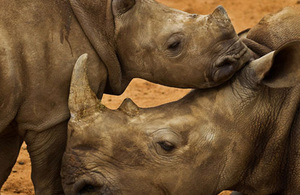Working with South African partners to protect rhinos, elephants and tigers
High Commissioner Judith Macgregor convened 60 civic leaders and youth activists to show support for efforts to end the illegal wildlife trade.

Image of a White Rhino calf, mother and juvenile male in holding pens at Hluhluwe-iMfolozi Park, South Africa, November 6 2010. This park is famous for its translocation programs which saved the Southern White Rhino from extinction. WWF is involved in fun
The High Commissioner and South African partners LEAD SA and Generation Earth discussed the urgent need to end the illegal wildlife trade and applauded existing efforts to protect wildlife.
30 students from Pretoria and Johannesburg made presentations, sang and performed skits to demonstrate their work to raise awareness of wildlife crime, particularly against rhinos.
High Commissioner Judith Macgregor reflected on the event and the UK’s work to help protect precious and iconic species like the rhino. UK and South Africa: Ending Illegal Wildlife Trade
Illegal wildlife trade is the subject of a high-level conference to be hosted by HRH The Prince of Wales and Foreign Secretary William Hague in London 13 February 2014. The UK is helping convene world leaders to agree ways to protect precious wildlife from poachers.
With more than 80% of Africa’s rhino population in the country, poaching and illegal wildlife trade is a real threat to South Africa’s economy, security and natural resources.
The London Conference is aimed at tackling three aspects of illegal wildlife trade:
-
Improving law enforcement and the role of the criminal justice system
-
Reducing demand for wildlife products
-
Supporting the development of sustainable livelihoods for communities affected by illegal wildlife trade.
The illegal wildlife trade is a serious criminal industry worth more than £6 billion each year. While threatening the future existence of whole species, it devastates already vulnerable communities, drives corruption and undermines efforts to cut poverty.
There is also a risk that insurgent or terrorist groups could benefit from the trade, which undermines the international rule of law and economies across Africa.
The London Conference will focus high level political attention, and better coordinate action across the globe, to stem the shocking rise in the trade of illegal wildlife products over the last decade, which has brought whole species to the brink of extinction.